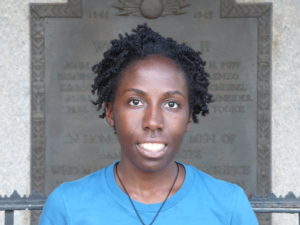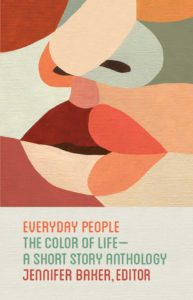An earlier version of this piece appeared in the September 2018 issue of The Practicing Writer newsletter.

An Anthologist Speaks: Q&A with Jennifer Baker
conducted by Erika Dreifus
The last week of August brought the publication of a new anthology from Atria Books: EVERYDAY PEOPLE: THE COLOR OF LIFE. As its publisher describes it, this is “a thoughtfully curated anthology of short stories that presents new and renowned work by established and emerging writers of color. It illustrates the dynamics of character and culture that reflect familial strife, political conflict, and personal turmoil through an array of stories that reveal the depth of the human experience.” Its contributors encompass “an eclectic mix of award-winning and critically lauded writers, including Mia Alvar, Carleigh Baker, Nana Brew-Hammond, Glendaliz Camacho, Alexander Chee, Mitchell S. Jackson, Yiyun Li, Allison Mills, Courttia Newland, Dennis Norris II, Jason Reynolds, Nelly Rosario, Hasanthika Sirisena, and Brandon Taylor.” And its editor is Jennifer Baker, who graciously agreed to answer a few questions via email for this newsletter feature.
Jenn is a publishing professional, creator/host of the Minorities in Publishing podcast, and contributing editor to ELECTRIC LITERATURE. She has done social media for Sackett Street Writers’ Workshop and the nonprofit We Need Diverse Books (where she was also a panel organizer), and is presently doing social media for the I, Too Arts Collective. She has led writing courses for Sackett Street, I, Too Arts, and independently. In 2017, she was awarded a NYSCA/NYFA Fellowship & Queens Council on the Arts New Work Grant (as well as the latter’s award for Artistic Excellence) for Nonfiction Literature. Her writing has appeared in NEWTOWN LITERARY (where her short story “The Pursuit of Happiness” was nominated for a 2017 Pushcart Prize), BOSTON LITERARY, ECLECTIC FLASH, KWELI JOURNAL, THE OFFING, POETS & WRITERS, THE OTHER STORIES podcast, and THE FEMALE COMPLAINT anthology (Shade Mountain Press), among others.
Please welcome Jennifer Baker!
ERIKA DREIFUS (ED): In the anthology’s introduction, Jenn, you write, “As I told the contributors when I approached them, EVERYDAY PEOPLE isn’t ‘my baby’ in terms of inception.” You credit the book’s origin to the late Brook Stephenson, whom you describe as “a wonderful person and literary citizen.” Please tell us a bit more about Brook Stephenson and how you came to take up this project after his passing.
JENNIFER BAKER (JB): Brook, and it’s still weird to say this in the past tense, was a massively cool guy and good person, as well as talented. He had a knack for bringing the Black literary community together. This was a goal of his via the Harlem Fete that continues with recognition of him every year. Brook created the Rhode Island Writers Colony, which is still in existence and to which royalties from EVERYDAY PEOPLE will go.
He had an idea for an all-Black anthology of contemporary voices. He passed suddenly, but Atria and the editor who worked with Brook on the proposal there, Todd Hunter, really wanted to keep this book going. Todd found me via my advocacy work and podcast. Believe me, I did think long and hard about taking on this project, but I also very much wanted to do Brook justice when I said yes.
ED: You also mention soliciting and corresponding with contributors. Had the contributor list been decided by the time you came on board? Were submissions at all open to unsolicited writers? How did you finalize the list of included stories?
JB: Brook did have a list of writers he wanted because, at that time, the proposal was for an all-Black anthology. When I saw the title I asked if this could be inclusive of various PoC/Indigenous voices because I wanted it to stand out even more. I couldn’t name too many titles major publishers had supported in anthology form that included only PoC/Indigenous writers. Some of those I asked and who are included in EVERYDAY PEOPLE had overlap with Brook’s original list, as he and I had similar interests. So, there was no open call, this was a curated list. Which in some respects is harder because you’re unsure of what you’re getting in the end.
Not all the original contributors attached are in the final anthology, for various reasons. And that happens, it’s just the way of the world in publishing. I am incredibly happy with the final product because it really does reflect a wonderful range. Of course, if I’d had more time, and money, I’d love to have included even more since I don’t think we can have enough PoC/Indigenous voices.
ED: I know that you made one change to the anthology pretty late in the game, removing the concluding story by Junot Diaz. Can you please tell us a bit about how the decision was made to take it out–and how you determined what would appear in its place?
JB: It was a fairly quick decision for me once I heard from those online speaking out about assault. I don’t openly discuss what I’ve dealt with in that realm for a reason, so I recognize that it’s not easy to speak out. It never is. I had chosen Junot’s story because I admire his work, but I also have to take into consideration how his work is read by others and what it means to continue to speak out as a woman of color, a woman who has been assaulted, and a supporter of other artists. As I told my publisher, this wasn’t a PR move to remove Junot’s story: It was a moral one. And I’m glad that my publisher understood and agreed on this count. In the end, the publicity team sent out a statement to those who had galleys about this late-stage change.
The idea of replacing the last story with a list of work by women (expanded to include nonbinary & transgender) writers of color came from my friend Maya Davis, whom I credit in the book, too. My publisher really liked the idea. I had two weeks to do it, which isn’t enough time, and I continue to fear that I’ve left off so many names. But I also recognize that it’s a beginning list of suggestions, not THE list to end all lists. Hopefully, going forward, those on this list will be sought out among MANY others within this community of PoC/Indigenous writers.
ED: How has editing this book interacted with/influenced your own writing?
JB: I’ve always been a line editor by nature because I work in production (aka managing editorial) for the past decade, which is most of my publishing career. This is a role that works a lot on content. Plus, I go to workshops/residencies annually, so even after leaving my MFA program, which I have many mixed feelings about, I’ve kept myself in the literary world meeting new people and learning from those I’ve encountered in workshops, whether as a leader or participant.
When it came to editing EVERYDAY PEOPLE, and even being an editor for ELECTRIC LITERATURE and in my day-to-day full-time job, I recognize some authors are not cool with edits. It hits their egos. Editors must approach editing from a logical yet considerate and specific standpoint. You have to outline what you’re seeing, if that’s the vision, how to make the work what it can be, and some people need more handholding than others. But always we editors come at it with respect for the artist and the work, or at least we should. I’m very lucky that I worked well with everyone in the final product of EVERYDAY PEOPLE. As a contributor to an anthology, I found the process easy: My story was accepted and underwent minor edits.
In the end, we all struggle, even as editors, no matter how many books or essays or stories we’ve published or edited or solicited. We struggle from zero draft to final product. So maybe as artists we can consider being less intimidated by the process–maybe we can recognize that we’re all in a similar boat and the main thing is to get to the finish line. Which can always happen as long as we push ourselves.

ED: Anything else you’d like to tell us?
JB: Be on the lookout for events in NYC (one that’s solidified is an event at Astoria Bookshop on September 10th), in DC, and possibly on the West Coast. There’ll also be a giveaway of copies in NYC on September 6th via Books on the Subway. So if you’re in NYC, seek those out! Otherwise, I stay relatively busy so if you follow me online or go to my website you’ll see I keep my calendar of events pretty updated.
ED: Thanks so much, Jenn, and congratulations again on the anthology.
Readers, please visit https://www.indiebound.org/book/9781501134944 for more about EVERYDAY PEOPLE, and don’t forget that you can find Jenn’s own online home at http://www.jennifernbaker.com.
My thanks to Jennifer Baker and Atria Books for the advance galley copy of EVERYDAY PEOPLE.
For more interviews, please check our extensive archive.